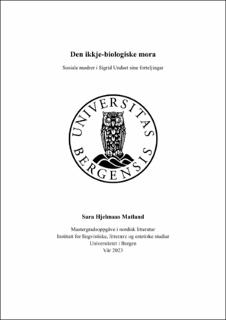| dc.contributor.author | Matland, Sara | |
| dc.date.accessioned | 2023-06-20T00:19:20Z | |
| dc.date.available | 2023-06-20T00:19:20Z | |
| dc.date.issued | 2023-05-15 | |
| dc.date.submitted | 2023-06-19T22:02:07Z | |
| dc.identifier.uri | https://hdl.handle.net/11250/3072116 | |
| dc.description.abstract | Denne masteravhandlinga tar føre seg tre av Sigrid Undset sine forteljingar. I «Frøken Smith-Tellefsen» frå Fattige skjæbner (1912) og «Thjodolf» og «Gunvald og Emma» frå De kloge jomfruer (1918) skriv Undset om kvinner som er mødrer for barn dei ikkje har født sjølv. Gjennom ein personorientert tredjepersonsforteljar vert dei ikkje-biologiske mødrene sine erfaringar og utfordringar løfta fram, og Undset viser med dette tydeleg ei forståing av moderskapet som noko sosialt heller enn noko biologisk. Moderskap som tema er gjennomgåande i forfattarskapet, og har i tidlegare lesingar vorte tolka som ideologifremmande og antifeministisk. Ved å undersøke korleis Undset framstiller dei ikkje-biologiske mødrene i forteljingane sine, meiner eg å vise korleis desse hundre år gamle skjønnlitterære refleksjonane kring dei ikkje-biologiske mødrene sin situasjon òg kan vere aktuelle i dag. Forteljingane vert lesne opp mot både den samtidige moderskapsdebatten og nåtidige moderskapsteoriar, samt nyare forskingslitteratur frå ulike forskingsfelt som seier noko om ikkje-biologisk moderskap. Med omgrep frå Simone de Beauvoir, Sara Ruddick og Patrice DiQuinzio viser eg korleis ein kan forstå kvinnene i forteljingane som mødrer, blant anna gjennom det viktige morsarbeidet dei gjer. Det viser seg at forskjellane mellom morserfaringane ei biologisk og ei ikkje-biologisk mor gjer seg ikkje nødvendigvis er så store som ein gjerne har sett føre seg. At Undset òg gir rom for dei biologiske mødrene i forteljingane, viser oss tydeleg at det ikkje er biologi, men heller omsorg og oppdragarevne som avgjer moderlegheit. I analysane av dei tre forteljingane viser eg vidare korleis Undset løftar fram mange av dei same utfordringane som den moderne faglitteratur om ikkje-biologiske moderskap peikar på. At dei ikkje-biologiske mødrene ofte ikkje vert anerkjent eller sett som mødrer, er eit gjennomgåande poeng i både teorien og skjønnlitteraturen, og difor argumenterer eg òg for at det Undset gjer med desse forteljingane er av klar feministisk interesse. Gjennom hovudkarakterane Aasta, Helene og Emma presenterer ho oss for tre forskjellege moderskap, og ho gjer dette på ein realistisk og nyansert måte som på mange måtar vil vise til verkelege kvinner sine situasjonar. | |
| dc.description.abstract | This MA thesis examines three short stories written by Sigrid Undset. In “Frøken Smith-Tellefsen” from Fattige skjæbner (1912), and “Thjodolf” and “Gunvald og Emma” from De kloge jomfruer (1918), Undset writes about women who mother children they have not birthed themselves. Through a third person limited point of view narrator, the non-biological mothers’ experiences and challenges are highlighted, and Undset clearly shows an understanding of motherhood as social rather than biological. Motherhood is a consistent theme in Undset’s writings and has previously been interpreted as ideologically promoting and anti-feminist. By examining how Undset portrays the non-biological mothers in her stories, I intend to show how these hundred-year-old fictional reflections on the situation of the non-biological mothers also can be relevant today. I read the stories in the context of the contemporary motherhood debate and modern motherhood theories, as well as recent research literature from various fields that all say something about non-biological motherhood. Using terms from Simone de Beauvoir, Sara Ruddick, and Patrice DiQuinzio, I show how the women in the stories can be understood as mothers, for example through the important mothering work they do. My research shows that the differences between the mothering experiences of the biological and the non-biological mother are not as substantial as initially expected. The fact that Undset also makes room for the biological mothers to take part in the stories, shows us that it is not biology, but rather care and guardianship that define the maternal. In my readings of the three stories, I show how Undset points to many of the same challenges as the modern-day literature concerning non-biological motherhood. A consistent point in both theory and fiction is that the non-biological mothers often are not recognized, nor seen as mothers. Therefore, I also argue that Undset’s representation of mothers in her stories are of apparent feminist interest. Through the main characters Aasta, Helene and Emma, Undset realistically nuances three different experiences of motherhood, which in several ways reflects the situations of real women. | |
| dc.language.iso | nno | |
| dc.publisher | The University of Bergen | |
| dc.rights | Copyright the Author. All rights reserved | |
| dc.subject | Sigrid Undset | |
| dc.subject | De kloge jomfruer | |
| dc.subject | Fattige skjæbner | |
| dc.subject | moderskap | |
| dc.subject | sosialt moderskap | |
| dc.subject | ikke-biologisk moderskap | |
| dc.title | Den ikkje-biologiske mora. Sosiale mødrer i Sigrid Undset sine forteljingar | |
| dc.title.alternative | The non-biological mother. Social mothers in Sigrid Undset's short stories | |
| dc.type | Master thesis | |
| dc.date.updated | 2023-06-19T22:02:07Z | |
| dc.rights.holder | Copyright the Author. All rights reserved | |
| dc.description.degree | Mastergradsoppgave i nordisk språk og litteratur | |
| dc.description.localcode | NOLISP350 | |
| dc.description.localcode | MAHF-NORD | |
| dc.description.localcode | MAHF-LÆNO | |
| dc.subject.nus | 711123 | |
| fs.subjectcode | NOLISP350 | |
| fs.unitcode | 11-21-0 | |
